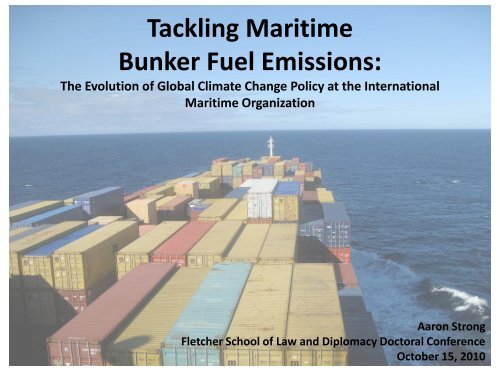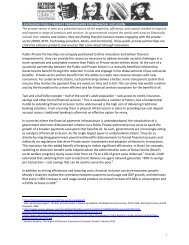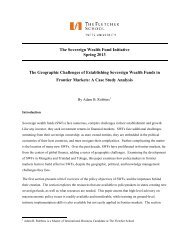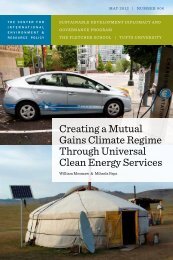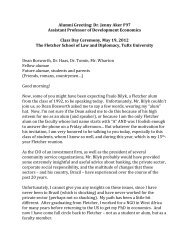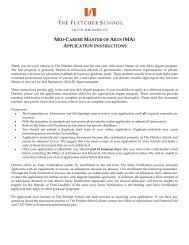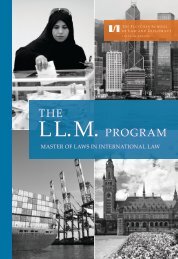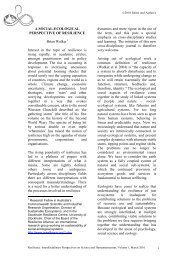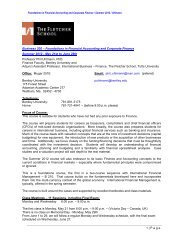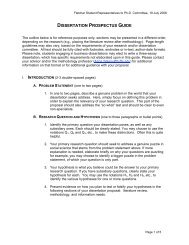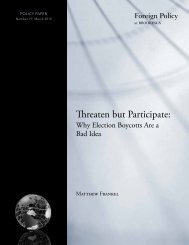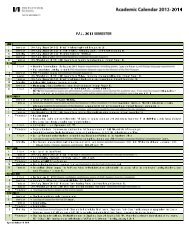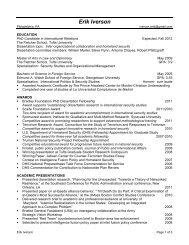Presentation - Fletcher School of Law and Diplomacy
Presentation - Fletcher School of Law and Diplomacy
Presentation - Fletcher School of Law and Diplomacy
You also want an ePaper? Increase the reach of your titles
YUMPU automatically turns print PDFs into web optimized ePapers that Google loves.
Tackling Maritime<br />
Bunker Fuel Emissions:<br />
The Evolution <strong>of</strong> Global Climate Change Policy at the International<br />
Maritime Organization<br />
Aaron Strong<br />
<strong>Fletcher</strong> <strong>School</strong> <strong>of</strong> <strong>Law</strong> <strong>and</strong> <strong>Diplomacy</strong> Doctoral Conference<br />
October 15, 2010
• What is the International Maritime Organization<br />
• Greenhouse Gas Emissions from the international<br />
maritime industry are only 2.7% <strong>of</strong> global anthropogenic<br />
emissions…so why focus on the IMO’s Climate Change<br />
Policies
The Essential Problems<br />
• Competing Institutional Principles:<br />
- Equal Treatment <strong>of</strong> Ships vs. CBDR<br />
• The Carbon Reality <strong>of</strong> Shipping:<br />
- Long Fleet Lifetime, Predicted Growth
Current State <strong>of</strong> Affairs (IMO)<br />
• Energy Efficiency Design Index (EEDI)<br />
(voluntary in 2009->m<strong>and</strong>atory in 2011!)<br />
• Ship Energy Efficiency Management Plan (SEEMP)<br />
(voluntary in 2009-> m<strong>and</strong>atory)<br />
• Market Based Measures (MBMs)<br />
(expert group in 2010->expert group in 2011)<br />
• Energy Efficiency Operational Index (EEOI)<br />
(st<strong>and</strong>ard for monitoring <strong>and</strong> evaluation)<br />
• IMO Greenhouse Gas Studies<br />
(2000 <strong>and</strong> 2009)<br />
• M<strong>and</strong>atory Audit Scheme<br />
(2015)
State <strong>of</strong> Affairs (extra-IMO)<br />
• European Union Unilateral Action<br />
(Shipping emissions into the EU-ETS-> end <strong>of</strong> 2011)<br />
• UNFCCC AWG-LCA Process<br />
(“Cook Isl<strong>and</strong>s Text”-> path forward in UNFCCC)<br />
(Seen as source <strong>of</strong> potential funds)<br />
(Blockage <strong>and</strong> Ripeness)
Two Sets <strong>of</strong> Research Questions<br />
Set 1: Institutional Factors<br />
How has the IMO as an institution addressed climate change over time, <strong>and</strong><br />
why<br />
Set 2: The Role <strong>of</strong> Science <strong>and</strong> Technology<br />
How have scientific considerations relating to methods <strong>of</strong> attribution <strong>of</strong><br />
emissions <strong>and</strong> technical considerations related to reducing emissions<br />
influenced IMO’s policy-making
Methodology<br />
Process Tracing (George <strong>and</strong> Bennett)<br />
Elite Interviews<br />
IMO Technical Experts<br />
Delegates to IMO Working Group <strong>and</strong> Expert Group Meetings<br />
NGO/Observers at COP15 <strong>and</strong> IMO<br />
UNFCCC Cancun COP16<br />
Negotiation Observation<br />
Summer 2010 Energy Efficiency Working Group, MBM Expert Group<br />
Documentary Sources<br />
Full history <strong>of</strong> MEPC, Sub-Committee <strong>and</strong> Working Group meeting reports<br />
relating to CO2 <strong>and</strong> climate change from 1980s to present
Question Set 1:<br />
Institutional Factors<br />
• Why did it take 17 years (from UNFCCC in 1992 until 2009) for the IMO to<br />
develop its first measures for reducing carbon dioxide emissions<br />
• What factors both within <strong>and</strong> outside the IMO influenced the course <strong>of</strong><br />
development <strong>of</strong> the IMO’s approach to climate change <strong>and</strong> how did these<br />
inside/outside factors interact<br />
• How has the relationship <strong>of</strong> the IMO with the UNFCCC evolved over time <strong>and</strong><br />
how have these relationships shaped IMO’s approach to climate change
Timeline<br />
1992 1996 2000 2004 2008 2012<br />
IMO<br />
Deliberations<br />
IMO<br />
Decisions<br />
IMO<br />
GHG Studies<br />
UNFCCC<br />
Actions
IMO Climate Change Policy<br />
• There were several identifiable political opportunities available to the MEPC <strong>and</strong><br />
IMO during the 1990s to act on carbon dioxide emissions, but a combination <strong>of</strong> the<br />
institutional schedule <strong>of</strong> the MEPC, the lack <strong>of</strong> champions for the issue within the IMO<br />
(<strong>and</strong> lack <strong>of</strong> pressure), as well as interests within the shipping industry prevented<br />
meaningful action. Result : First GHG STUDY.<br />
• Once the Kyoto Protocol was agreed <strong>and</strong> the principle <strong>of</strong> CBDR coalesced, options<br />
for action within the IMO were restricted <strong>and</strong> a balancing-act negotiation was<br />
initiated, which has continued to this day.<br />
• The IMO has consistently acted on climate change only when pressure from the<br />
UNFCCC has forced it to do so. Each time, however, in an effort to maintain ownership<br />
<strong>of</strong> the issue, the IMO has sought to act before the UNFCCC.<br />
• CBDR has proved stronger than equal treatment for all ships. The maritime industry<br />
is attempting to stave <strong>of</strong>f UNFCCC-ownership by moving modestly within the IMO.<br />
Will the EEDI be enough to do this!
Science<br />
Question Set 2: The Role <strong>of</strong><br />
Science <strong>and</strong> Technology<br />
• How are st<strong>and</strong>ards for carbon accounting developed in the IMO <strong>and</strong> what<br />
role do considerations <strong>of</strong> the carbon cycle play in attribution <strong>of</strong> emissions<br />
within the IMO<br />
Technology <strong>and</strong> Innovation<br />
• What role does the current state <strong>of</strong> technology play in shaping IMO<br />
energy efficiency policies<br />
• What is the role <strong>of</strong> IMO environmental policy in driving technological<br />
innovation within the maritime industry<br />
• Do these conclusions equally apply to the scientific <strong>and</strong> technical<br />
information required for other market-based measures for the shipping<br />
industry<br />
• If technological innovation can only reduce emissions in the long<br />
does the policy-making process place taken a long-term view<br />
run,
Technology <strong>and</strong> Innovation<br />
• What role does the current state <strong>of</strong> technology play in shaping IMO<br />
energy efficiency policies<br />
The technical expertise within the IMO is high, <strong>and</strong> part <strong>of</strong> the slowness <strong>of</strong> action on<br />
emissions can be attributed to a desire to “get the policy right” so that it is technically<br />
sound for all portions <strong>of</strong> the shipping industry (i.e. all ship types <strong>and</strong> situations).
Technology <strong>and</strong> Innovation<br />
• What is the role <strong>of</strong> IMO environmental policy in driving technological<br />
innovation within the maritime industry<br />
• There is evidence from other IMO marine environmental protection regimes<br />
that IMO regulations can spur maritime industry innovation (e.g. Ballast Water<br />
Management Convention.)<br />
• M<strong>and</strong>atory measures are likely to influence industry innovation in part<br />
because they are to be implemented for new ships <strong>and</strong> will ramp up in<br />
stringency over time.<br />
• According to several experts, whatever makes it into the “m<strong>and</strong>atory”<br />
requirements is likely to be ‘dwarfed’ by the impact <strong>of</strong> higher fuel prices on<br />
innovation.
Technology <strong>and</strong> Innovation<br />
• Do these conclusions equally apply to the scientific <strong>and</strong> technical<br />
information required for other market-based measures for the shipping<br />
industry<br />
The institutional history <strong>of</strong> technical requirements <strong>and</strong> engineering<br />
specifications, coupled with the lack <strong>of</strong> economic expertise among country<br />
representatives within the IMO, may contribute to the slowness with which<br />
market-based measures have been advanced.<br />
The economic expertise necessary for policy-debate also leads to stronger<br />
maritime industry control over the treatment <strong>of</strong> market-based measures within<br />
the IMO.
Technology <strong>and</strong> Innovation<br />
• If technological innovation can only reduce emissions in the long<br />
does the policy-making process place taken a long-term view<br />
run,<br />
While there is recognition amongst experts within the IMO <strong>and</strong> amongst many<br />
negotiators that the policy-making process will have limited impact on emissions in<br />
the short-run, <strong>and</strong> the EEDI has been developed as a long-term approach to<br />
reducing emissions that is palatable to industry interests, the façade <strong>of</strong> IMO action<br />
presented to the UNFCCC <strong>and</strong> to the world by the IMO External Relations Office<br />
blurs these distinctions in order to retain control <strong>of</strong> the policy area.<br />
Update: The breakdown <strong>of</strong> talks at the MEPC 61 in October 2010 evinced a lack <strong>of</strong><br />
progress that may have future ramifications for IMO control.
Managing Technical Complexity<br />
<strong>and</strong> Governing the Global<br />
Environment<br />
• Scientific <strong>and</strong> technical complexity is strongly political (but it’s not all equally political:<br />
baselines, ship-types, speeds, safety, models, methodologies, how you attribute<br />
emissions).<br />
• The ad-hoc nature <strong>of</strong> the process increases under issue saturation <strong>and</strong> technical<br />
complexity<br />
• Despite the lack <strong>of</strong> institutional hierarchy, the threat <strong>of</strong> unilateral UNFCCC (or EU)<br />
action on this issue, induces action within the IMO, but this action is designed to be<br />
minimally sufficient to stave <strong>of</strong>f others from acting on their threats.<br />
• This institutional inequality may be do to the narrower remit <strong>of</strong> action on climate<br />
change within the IMO.
Questions<br />
Acknowledgments: I’d like to thank Pr<strong>of</strong>essor Sims Gallagher for her tireless advising. Mr. Berty Nayna <strong>and</strong> Ms.<br />
Marianne Harvey at the IMO for their help arranging interviews, negotiation observations, <strong>and</strong> documentary access<br />
<strong>and</strong> Ms. Carolyne Okeijn for her notes from MEPC 61 two weeks ago. I thank the Gordon <strong>and</strong> Betty Moore<br />
Foundation for support to attend COP15 in Copenhagen, the Hitachi Center for Technology <strong>and</strong> International Affairs<br />
<strong>and</strong> the Tufts Institute <strong>of</strong> the Environment for research fellowship support for my research attachment at the IMO <strong>and</strong><br />
my transatlantic voyage on the MSC Flaminia, <strong>and</strong> finally the Energy Climate <strong>and</strong> Innovation Group at the Center for<br />
International Environment <strong>and</strong> Resource Policy for support to attend COP16 in Cancun this coming December.


